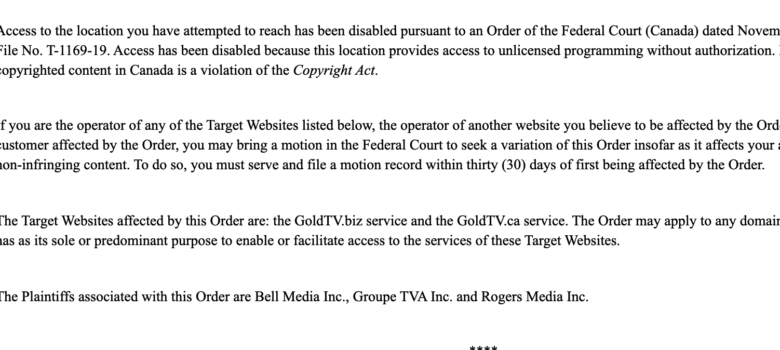Last week I wrote about a federal court ruling that opened the door to copyright website blocking in Canada without Parliament establishing site blocking rules or the involvement of the CRTC. The decision is flawed from both a policy and legal perspective, substituting the views of one judge over Parliament’s judgment and relying on a foreign copyright case that was rendered under markedly different legal rules than those found in Canada. I concluded by noting that the case should be appealed and just over a week later, TekSavvy, the independent ISP that stood alone in contesting the blocking order, did just that. Even as the appeal was launched, however, the major Canadian ISPs began blocking access to the specific webpages identified in the court order.
The TekSavvy notice of appeal argues that the blocking ruling contains several errors, including that:
- an order to third party ISPs to engage in site blocking is available under the Copyright Act
- Section 36 of the Telecommunications Act did not apply to the site blocking order
- the test used for a mandatory injunction, particularly the reliance on factors from foreign jurisdictions (the significant reliance on the UK Cartier case)
- the order is not compliant with the Charter of Rights and Freedoms
These are important issues and it was essential that an appellate court review them. The appeal will provide an opportunity for a more detailed examination of these issues and for other parties to consider intervening in the case. Public interest and free speech groups should certainly become engaged as should the CRTC, given that the decision significantly circumscribes its governing legislation. The Commission concluded that it did not have the legislative power to establish a site blocking system, but it did not say that the Telecommunications Act does not apply in such cases.
The fact that TekSavvy stands alone for the moment highlights how Canada is an outlier when it comes to communications services. In most countries, legal cases involving site blocking are defended by ISPs, who challenge efforts to require them to block access to content. Yet in Canada, those cases are launched by the ISPs themselves, with companies such as Bell and Rogers siding with their content business over their millions of wireless and broadband customers.
Those companies earlier began complying with the court order by blocking access to the specific URLs it identified. As a Rogers customer, access to billing.goldtv.biz generates this page:

GoldTV.biz block page
There have been similar reports at ISPs across the country.








Another reason not to be with Bell or Rogers. The pocketbook is the end all and be all.
I applaud TekSavvy in this instance for protecting free speech. If let unchallenged this would likely pave the way for an website blocking industry panel within 5 years.
Since when it became acceptable and right to ask others to block access to an alleged crooks instead of doing the right job, their job, and actually go after the so called crooks.
I am using an independent ISP which uses part of the Shaw network. Navigation to http://billing.goldtv.biz/ is blocked. Using firefox I get:
Hmm. We’re having trouble finding that site.
We can’t connect to the server at billing.goldtv.biz.
If that address is correct, here are three other things you can try:
Try again later.
Check your network connection.
If you are connected but behind a firewall, check that Firefox has permission to access the Web.
Pingback: Westcom Medium ~ Info Tech Industry News December 1, 2019
Pingback: News of the Week; November 27, 2019 – Communications Law at Allard Hall